Analyzing the Business Analyst's Role in Integrated Library Systems
VerifiedAdded on 2020/02/24
|12
|3020
|70
Report
AI Summary
This report delves into the pivotal role of a Business Analyst within an Integrated Library System (ILS), focusing on a case study involving a public library's migration to a modernized ILS. It outlines the six core knowledge areas of business analysis—planning and monitoring, elicitation and collaboration, requirements life cycle management, strategy analysis, requirements analysis and design definition, and solution evaluation—and details the specific responsibilities of a business analyst within each area. The report emphasizes the importance of understanding stakeholder needs, facilitating efficient system customization, and ensuring the effective handling of multiple barcoding processes, which is a key challenge addressed by the new ILS. It highlights the necessary competencies, tools, and strategic thinking skills required for a business analyst to successfully implement and manage the ILS, ultimately improving library operations and stakeholder satisfaction.
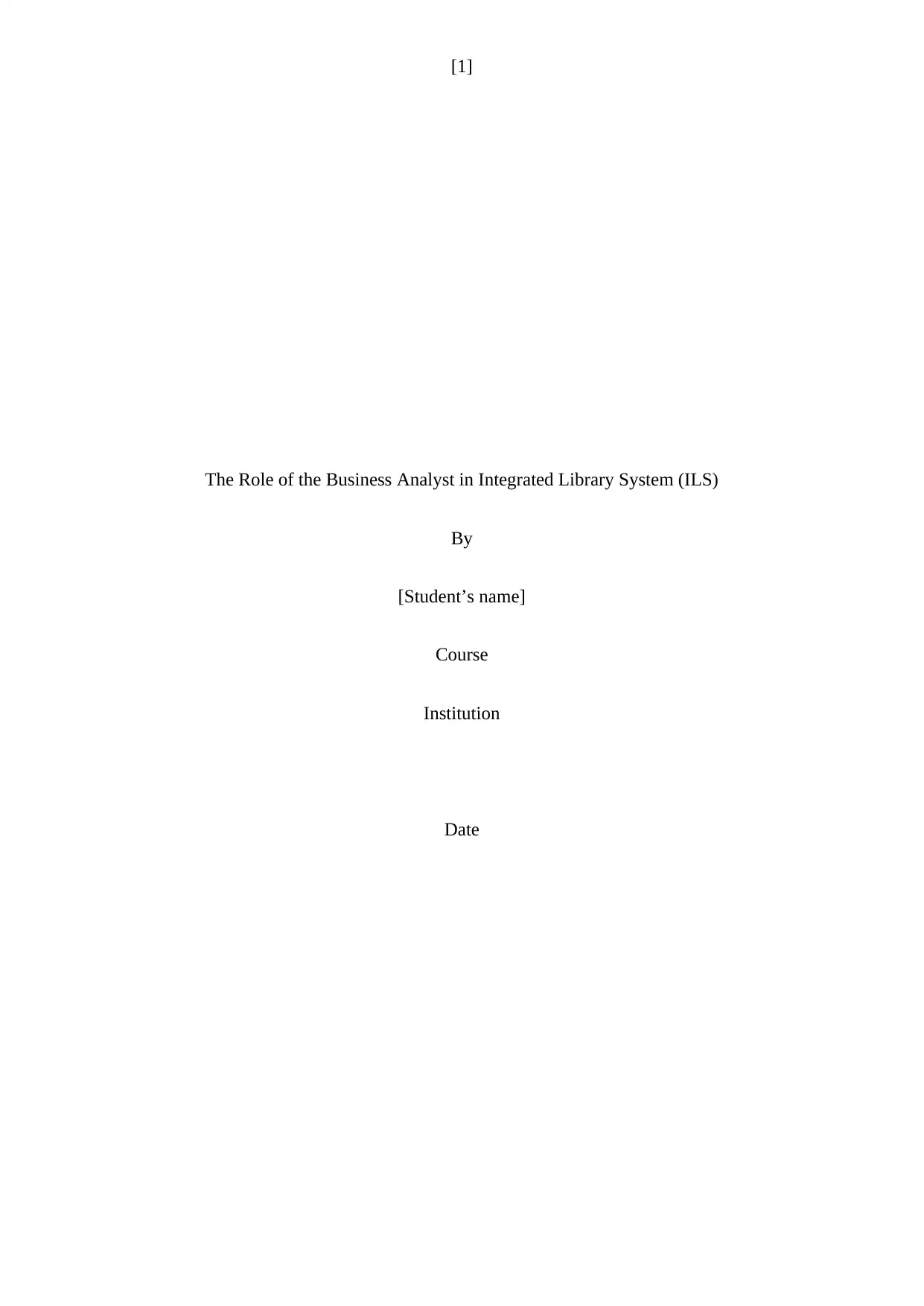
[1]
The Role of the Business Analyst in Integrated Library System (ILS)
By
[Student’s name]
Course
Institution
Date
The Role of the Business Analyst in Integrated Library System (ILS)
By
[Student’s name]
Course
Institution
Date
Paraphrase This Document
Need a fresh take? Get an instant paraphrase of this document with our AI Paraphraser
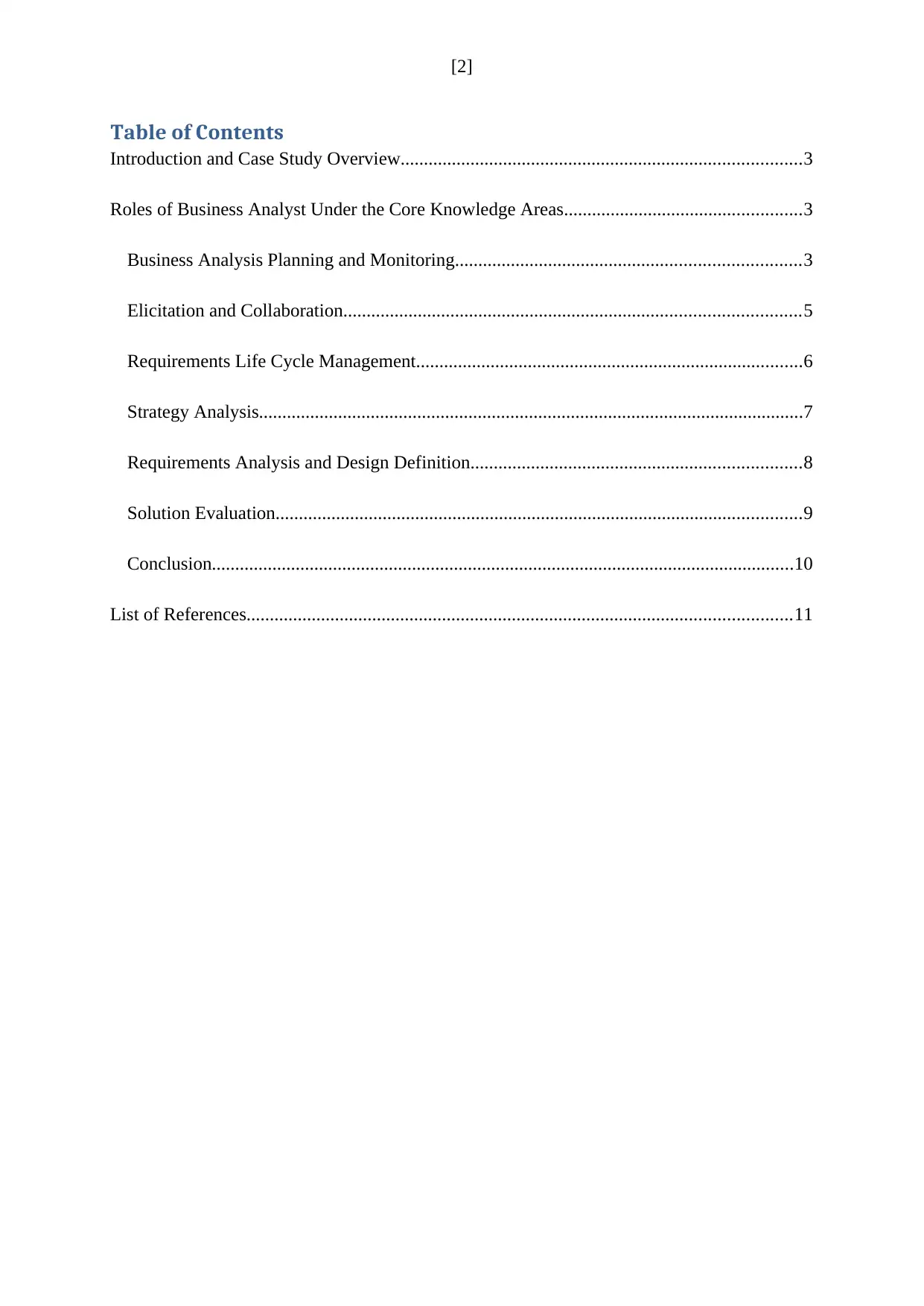
[2]
Table of Contents
Introduction and Case Study Overview......................................................................................3
Roles of Business Analyst Under the Core Knowledge Areas...................................................3
Business Analysis Planning and Monitoring..........................................................................3
Elicitation and Collaboration..................................................................................................5
Requirements Life Cycle Management...................................................................................6
Strategy Analysis.....................................................................................................................7
Requirements Analysis and Design Definition.......................................................................8
Solution Evaluation.................................................................................................................9
Conclusion.............................................................................................................................10
List of References.....................................................................................................................11
Table of Contents
Introduction and Case Study Overview......................................................................................3
Roles of Business Analyst Under the Core Knowledge Areas...................................................3
Business Analysis Planning and Monitoring..........................................................................3
Elicitation and Collaboration..................................................................................................5
Requirements Life Cycle Management...................................................................................6
Strategy Analysis.....................................................................................................................7
Requirements Analysis and Design Definition.......................................................................8
Solution Evaluation.................................................................................................................9
Conclusion.............................................................................................................................10
List of References.....................................................................................................................11
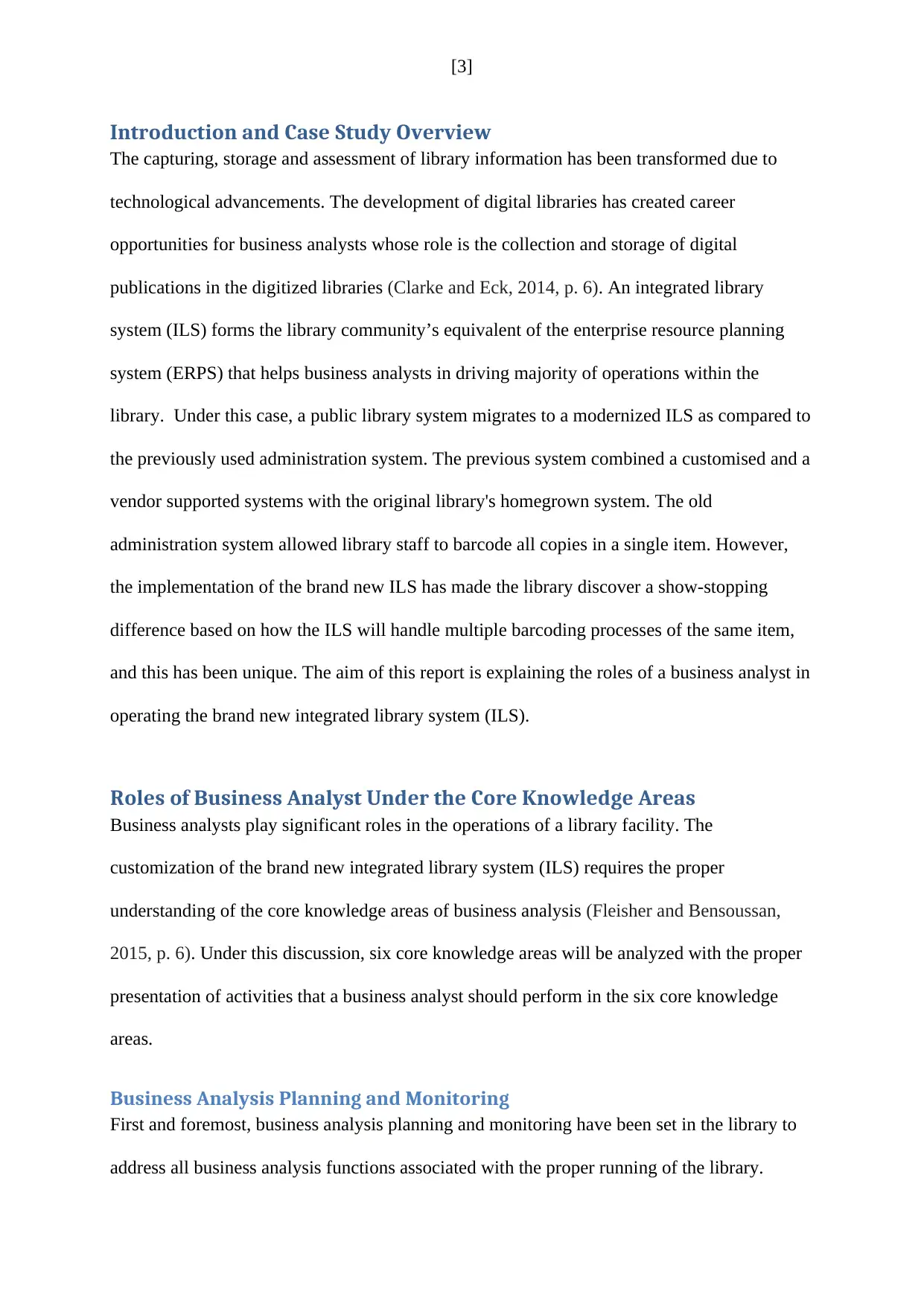
[3]
Introduction and Case Study Overview
The capturing, storage and assessment of library information has been transformed due to
technological advancements. The development of digital libraries has created career
opportunities for business analysts whose role is the collection and storage of digital
publications in the digitized libraries (Clarke and Eck, 2014, p. 6). An integrated library
system (ILS) forms the library community’s equivalent of the enterprise resource planning
system (ERPS) that helps business analysts in driving majority of operations within the
library. Under this case, a public library system migrates to a modernized ILS as compared to
the previously used administration system. The previous system combined a customised and a
vendor supported systems with the original library's homegrown system. The old
administration system allowed library staff to barcode all copies in a single item. However,
the implementation of the brand new ILS has made the library discover a show-stopping
difference based on how the ILS will handle multiple barcoding processes of the same item,
and this has been unique. The aim of this report is explaining the roles of a business analyst in
operating the brand new integrated library system (ILS).
Roles of Business Analyst Under the Core Knowledge Areas
Business analysts play significant roles in the operations of a library facility. The
customization of the brand new integrated library system (ILS) requires the proper
understanding of the core knowledge areas of business analysis (Fleisher and Bensoussan,
2015, p. 6). Under this discussion, six core knowledge areas will be analyzed with the proper
presentation of activities that a business analyst should perform in the six core knowledge
areas.
Business Analysis Planning and Monitoring
First and foremost, business analysis planning and monitoring have been set in the library to
address all business analysis functions associated with the proper running of the library.
Introduction and Case Study Overview
The capturing, storage and assessment of library information has been transformed due to
technological advancements. The development of digital libraries has created career
opportunities for business analysts whose role is the collection and storage of digital
publications in the digitized libraries (Clarke and Eck, 2014, p. 6). An integrated library
system (ILS) forms the library community’s equivalent of the enterprise resource planning
system (ERPS) that helps business analysts in driving majority of operations within the
library. Under this case, a public library system migrates to a modernized ILS as compared to
the previously used administration system. The previous system combined a customised and a
vendor supported systems with the original library's homegrown system. The old
administration system allowed library staff to barcode all copies in a single item. However,
the implementation of the brand new ILS has made the library discover a show-stopping
difference based on how the ILS will handle multiple barcoding processes of the same item,
and this has been unique. The aim of this report is explaining the roles of a business analyst in
operating the brand new integrated library system (ILS).
Roles of Business Analyst Under the Core Knowledge Areas
Business analysts play significant roles in the operations of a library facility. The
customization of the brand new integrated library system (ILS) requires the proper
understanding of the core knowledge areas of business analysis (Fleisher and Bensoussan,
2015, p. 6). Under this discussion, six core knowledge areas will be analyzed with the proper
presentation of activities that a business analyst should perform in the six core knowledge
areas.
Business Analysis Planning and Monitoring
First and foremost, business analysis planning and monitoring have been set in the library to
address all business analysis functions associated with the proper running of the library.
⊘ This is a preview!⊘
Do you want full access?
Subscribe today to unlock all pages.

Trusted by 1+ million students worldwide
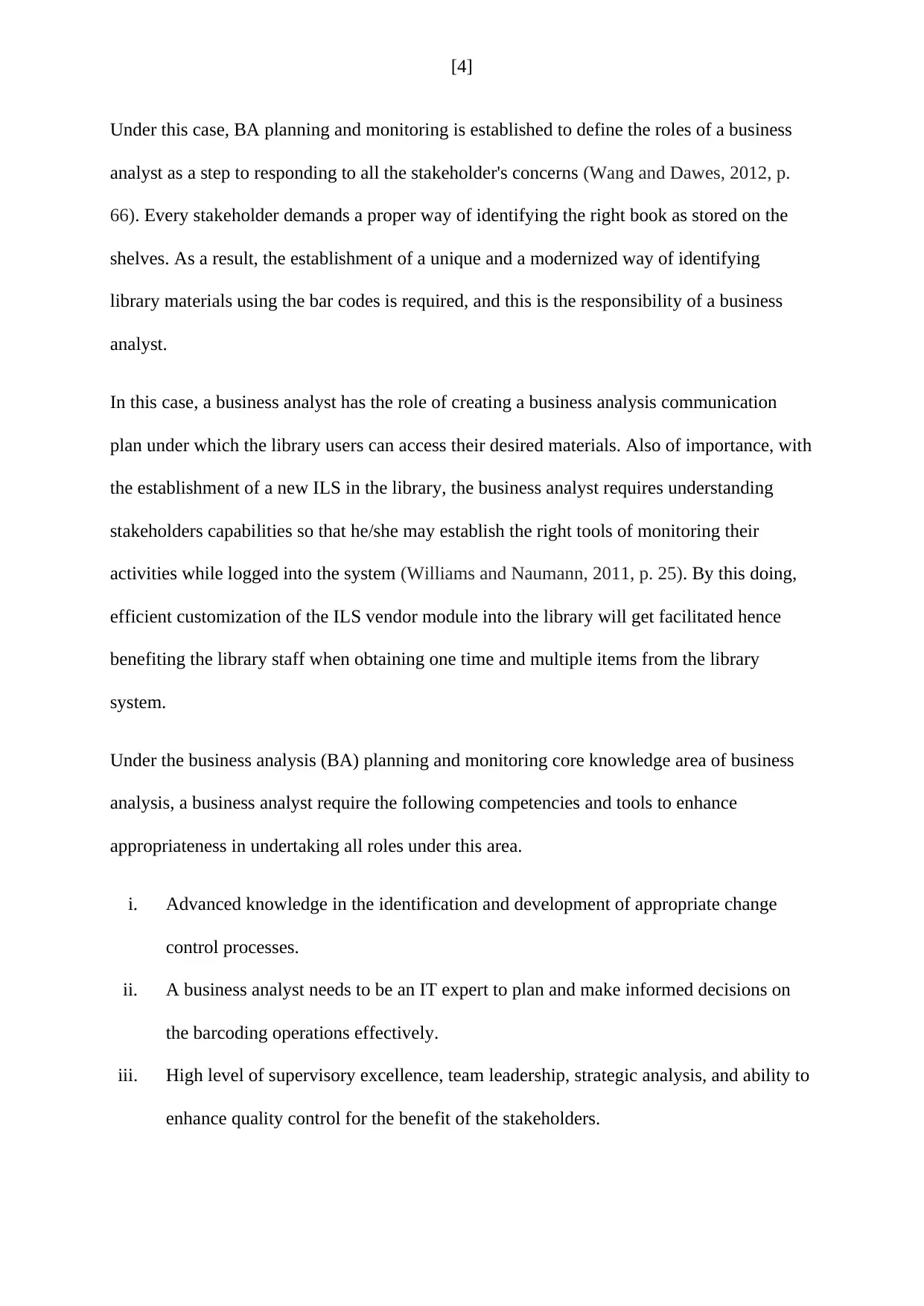
[4]
Under this case, BA planning and monitoring is established to define the roles of a business
analyst as a step to responding to all the stakeholder's concerns (Wang and Dawes, 2012, p.
66). Every stakeholder demands a proper way of identifying the right book as stored on the
shelves. As a result, the establishment of a unique and a modernized way of identifying
library materials using the bar codes is required, and this is the responsibility of a business
analyst.
In this case, a business analyst has the role of creating a business analysis communication
plan under which the library users can access their desired materials. Also of importance, with
the establishment of a new ILS in the library, the business analyst requires understanding
stakeholders capabilities so that he/she may establish the right tools of monitoring their
activities while logged into the system (Williams and Naumann, 2011, p. 25). By this doing,
efficient customization of the ILS vendor module into the library will get facilitated hence
benefiting the library staff when obtaining one time and multiple items from the library
system.
Under the business analysis (BA) planning and monitoring core knowledge area of business
analysis, a business analyst require the following competencies and tools to enhance
appropriateness in undertaking all roles under this area.
i. Advanced knowledge in the identification and development of appropriate change
control processes.
ii. A business analyst needs to be an IT expert to plan and make informed decisions on
the barcoding operations effectively.
iii. High level of supervisory excellence, team leadership, strategic analysis, and ability to
enhance quality control for the benefit of the stakeholders.
Under this case, BA planning and monitoring is established to define the roles of a business
analyst as a step to responding to all the stakeholder's concerns (Wang and Dawes, 2012, p.
66). Every stakeholder demands a proper way of identifying the right book as stored on the
shelves. As a result, the establishment of a unique and a modernized way of identifying
library materials using the bar codes is required, and this is the responsibility of a business
analyst.
In this case, a business analyst has the role of creating a business analysis communication
plan under which the library users can access their desired materials. Also of importance, with
the establishment of a new ILS in the library, the business analyst requires understanding
stakeholders capabilities so that he/she may establish the right tools of monitoring their
activities while logged into the system (Williams and Naumann, 2011, p. 25). By this doing,
efficient customization of the ILS vendor module into the library will get facilitated hence
benefiting the library staff when obtaining one time and multiple items from the library
system.
Under the business analysis (BA) planning and monitoring core knowledge area of business
analysis, a business analyst require the following competencies and tools to enhance
appropriateness in undertaking all roles under this area.
i. Advanced knowledge in the identification and development of appropriate change
control processes.
ii. A business analyst needs to be an IT expert to plan and make informed decisions on
the barcoding operations effectively.
iii. High level of supervisory excellence, team leadership, strategic analysis, and ability to
enhance quality control for the benefit of the stakeholders.
Paraphrase This Document
Need a fresh take? Get an instant paraphrase of this document with our AI Paraphraser
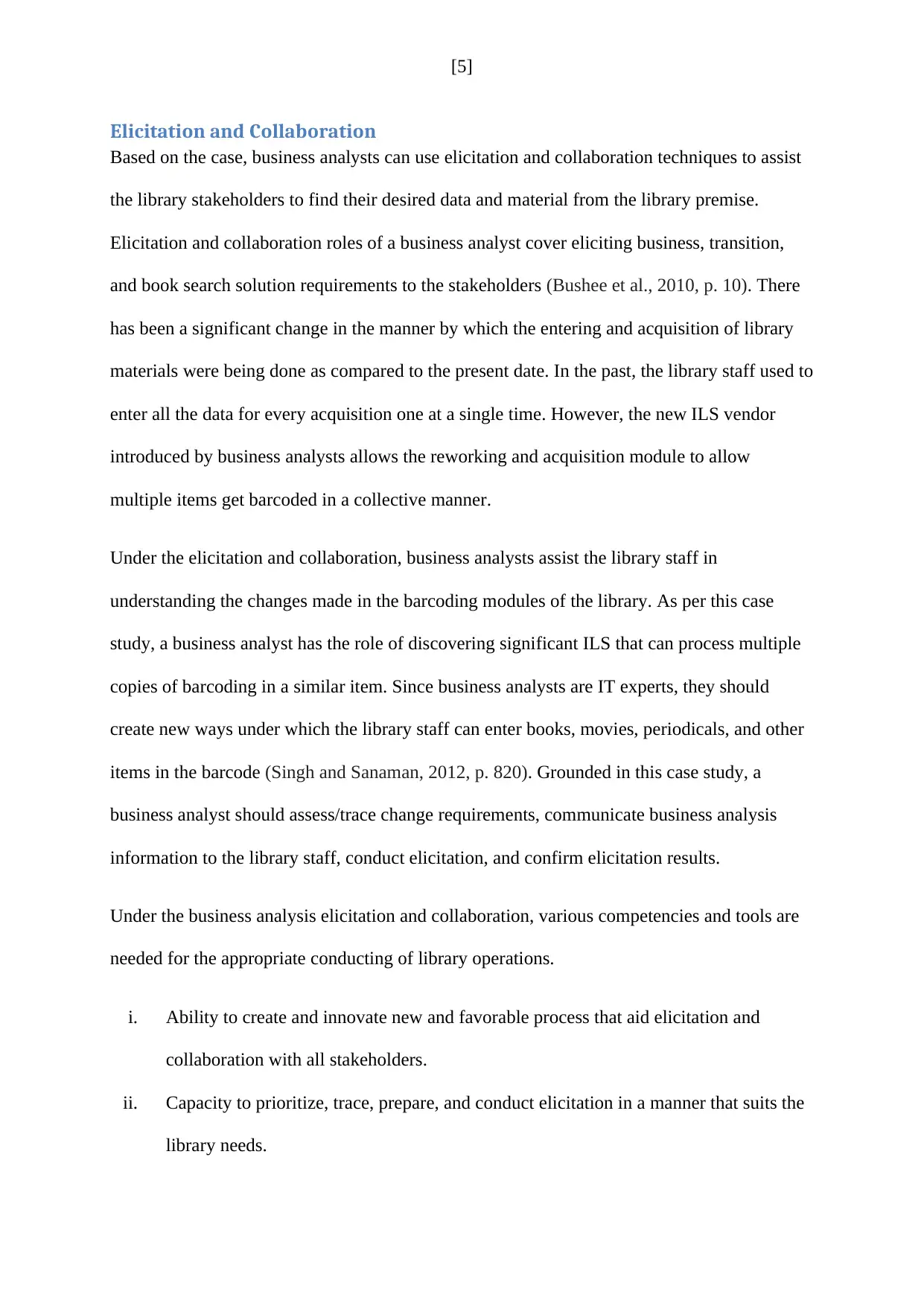
[5]
Elicitation and Collaboration
Based on the case, business analysts can use elicitation and collaboration techniques to assist
the library stakeholders to find their desired data and material from the library premise.
Elicitation and collaboration roles of a business analyst cover eliciting business, transition,
and book search solution requirements to the stakeholders (Bushee et al., 2010, p. 10). There
has been a significant change in the manner by which the entering and acquisition of library
materials were being done as compared to the present date. In the past, the library staff used to
enter all the data for every acquisition one at a single time. However, the new ILS vendor
introduced by business analysts allows the reworking and acquisition module to allow
multiple items get barcoded in a collective manner.
Under the elicitation and collaboration, business analysts assist the library staff in
understanding the changes made in the barcoding modules of the library. As per this case
study, a business analyst has the role of discovering significant ILS that can process multiple
copies of barcoding in a similar item. Since business analysts are IT experts, they should
create new ways under which the library staff can enter books, movies, periodicals, and other
items in the barcode (Singh and Sanaman, 2012, p. 820). Grounded in this case study, a
business analyst should assess/trace change requirements, communicate business analysis
information to the library staff, conduct elicitation, and confirm elicitation results.
Under the business analysis elicitation and collaboration, various competencies and tools are
needed for the appropriate conducting of library operations.
i. Ability to create and innovate new and favorable process that aid elicitation and
collaboration with all stakeholders.
ii. Capacity to prioritize, trace, prepare, and conduct elicitation in a manner that suits the
library needs.
Elicitation and Collaboration
Based on the case, business analysts can use elicitation and collaboration techniques to assist
the library stakeholders to find their desired data and material from the library premise.
Elicitation and collaboration roles of a business analyst cover eliciting business, transition,
and book search solution requirements to the stakeholders (Bushee et al., 2010, p. 10). There
has been a significant change in the manner by which the entering and acquisition of library
materials were being done as compared to the present date. In the past, the library staff used to
enter all the data for every acquisition one at a single time. However, the new ILS vendor
introduced by business analysts allows the reworking and acquisition module to allow
multiple items get barcoded in a collective manner.
Under the elicitation and collaboration, business analysts assist the library staff in
understanding the changes made in the barcoding modules of the library. As per this case
study, a business analyst has the role of discovering significant ILS that can process multiple
copies of barcoding in a similar item. Since business analysts are IT experts, they should
create new ways under which the library staff can enter books, movies, periodicals, and other
items in the barcode (Singh and Sanaman, 2012, p. 820). Grounded in this case study, a
business analyst should assess/trace change requirements, communicate business analysis
information to the library staff, conduct elicitation, and confirm elicitation results.
Under the business analysis elicitation and collaboration, various competencies and tools are
needed for the appropriate conducting of library operations.
i. Ability to create and innovate new and favorable process that aid elicitation and
collaboration with all stakeholders.
ii. Capacity to prioritize, trace, prepare, and conduct elicitation in a manner that suits the
library needs.
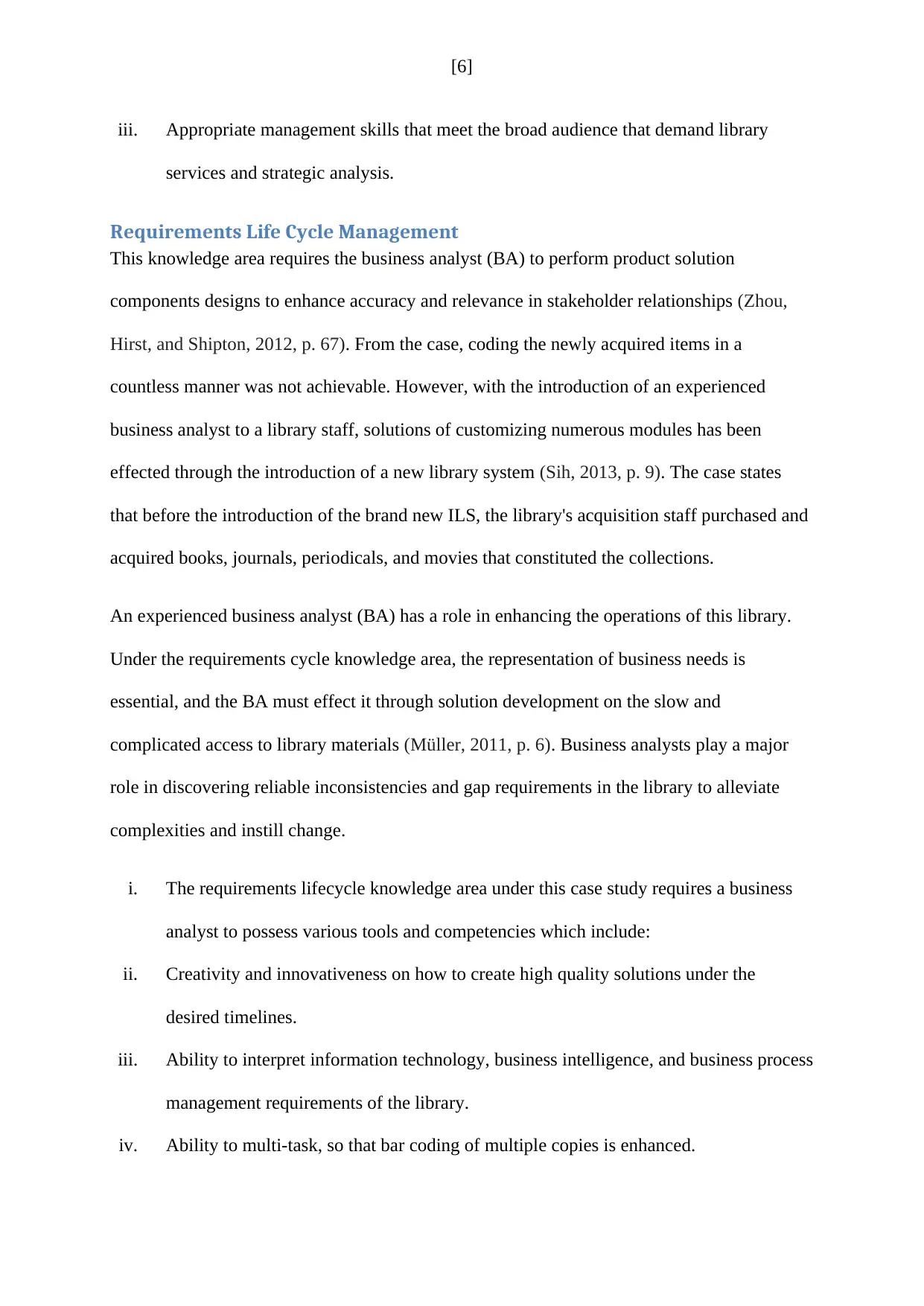
[6]
iii. Appropriate management skills that meet the broad audience that demand library
services and strategic analysis.
Requirements Life Cycle Management
This knowledge area requires the business analyst (BA) to perform product solution
components designs to enhance accuracy and relevance in stakeholder relationships (Zhou,
Hirst, and Shipton, 2012, p. 67). From the case, coding the newly acquired items in a
countless manner was not achievable. However, with the introduction of an experienced
business analyst to a library staff, solutions of customizing numerous modules has been
effected through the introduction of a new library system (Sih, 2013, p. 9). The case states
that before the introduction of the brand new ILS, the library's acquisition staff purchased and
acquired books, journals, periodicals, and movies that constituted the collections.
An experienced business analyst (BA) has a role in enhancing the operations of this library.
Under the requirements cycle knowledge area, the representation of business needs is
essential, and the BA must effect it through solution development on the slow and
complicated access to library materials (Müller, 2011, p. 6). Business analysts play a major
role in discovering reliable inconsistencies and gap requirements in the library to alleviate
complexities and instill change.
i. The requirements lifecycle knowledge area under this case study requires a business
analyst to possess various tools and competencies which include:
ii. Creativity and innovativeness on how to create high quality solutions under the
desired timelines.
iii. Ability to interpret information technology, business intelligence, and business process
management requirements of the library.
iv. Ability to multi-task, so that bar coding of multiple copies is enhanced.
iii. Appropriate management skills that meet the broad audience that demand library
services and strategic analysis.
Requirements Life Cycle Management
This knowledge area requires the business analyst (BA) to perform product solution
components designs to enhance accuracy and relevance in stakeholder relationships (Zhou,
Hirst, and Shipton, 2012, p. 67). From the case, coding the newly acquired items in a
countless manner was not achievable. However, with the introduction of an experienced
business analyst to a library staff, solutions of customizing numerous modules has been
effected through the introduction of a new library system (Sih, 2013, p. 9). The case states
that before the introduction of the brand new ILS, the library's acquisition staff purchased and
acquired books, journals, periodicals, and movies that constituted the collections.
An experienced business analyst (BA) has a role in enhancing the operations of this library.
Under the requirements cycle knowledge area, the representation of business needs is
essential, and the BA must effect it through solution development on the slow and
complicated access to library materials (Müller, 2011, p. 6). Business analysts play a major
role in discovering reliable inconsistencies and gap requirements in the library to alleviate
complexities and instill change.
i. The requirements lifecycle knowledge area under this case study requires a business
analyst to possess various tools and competencies which include:
ii. Creativity and innovativeness on how to create high quality solutions under the
desired timelines.
iii. Ability to interpret information technology, business intelligence, and business process
management requirements of the library.
iv. Ability to multi-task, so that bar coding of multiple copies is enhanced.
⊘ This is a preview!⊘
Do you want full access?
Subscribe today to unlock all pages.

Trusted by 1+ million students worldwide
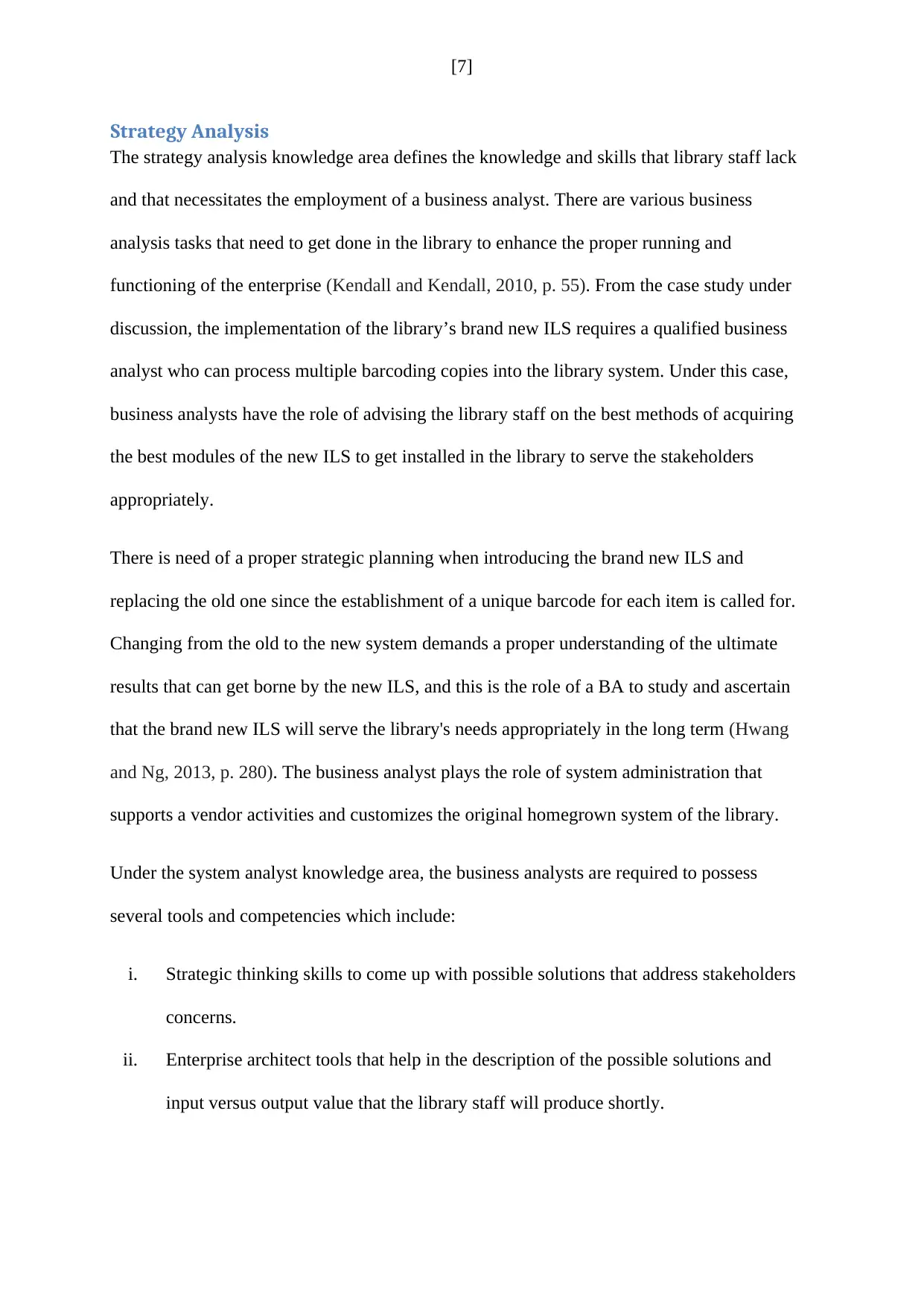
[7]
Strategy Analysis
The strategy analysis knowledge area defines the knowledge and skills that library staff lack
and that necessitates the employment of a business analyst. There are various business
analysis tasks that need to get done in the library to enhance the proper running and
functioning of the enterprise (Kendall and Kendall, 2010, p. 55). From the case study under
discussion, the implementation of the library’s brand new ILS requires a qualified business
analyst who can process multiple barcoding copies into the library system. Under this case,
business analysts have the role of advising the library staff on the best methods of acquiring
the best modules of the new ILS to get installed in the library to serve the stakeholders
appropriately.
There is need of a proper strategic planning when introducing the brand new ILS and
replacing the old one since the establishment of a unique barcode for each item is called for.
Changing from the old to the new system demands a proper understanding of the ultimate
results that can get borne by the new ILS, and this is the role of a BA to study and ascertain
that the brand new ILS will serve the library's needs appropriately in the long term (Hwang
and Ng, 2013, p. 280). The business analyst plays the role of system administration that
supports a vendor activities and customizes the original homegrown system of the library.
Under the system analyst knowledge area, the business analysts are required to possess
several tools and competencies which include:
i. Strategic thinking skills to come up with possible solutions that address stakeholders
concerns.
ii. Enterprise architect tools that help in the description of the possible solutions and
input versus output value that the library staff will produce shortly.
Strategy Analysis
The strategy analysis knowledge area defines the knowledge and skills that library staff lack
and that necessitates the employment of a business analyst. There are various business
analysis tasks that need to get done in the library to enhance the proper running and
functioning of the enterprise (Kendall and Kendall, 2010, p. 55). From the case study under
discussion, the implementation of the library’s brand new ILS requires a qualified business
analyst who can process multiple barcoding copies into the library system. Under this case,
business analysts have the role of advising the library staff on the best methods of acquiring
the best modules of the new ILS to get installed in the library to serve the stakeholders
appropriately.
There is need of a proper strategic planning when introducing the brand new ILS and
replacing the old one since the establishment of a unique barcode for each item is called for.
Changing from the old to the new system demands a proper understanding of the ultimate
results that can get borne by the new ILS, and this is the role of a BA to study and ascertain
that the brand new ILS will serve the library's needs appropriately in the long term (Hwang
and Ng, 2013, p. 280). The business analyst plays the role of system administration that
supports a vendor activities and customizes the original homegrown system of the library.
Under the system analyst knowledge area, the business analysts are required to possess
several tools and competencies which include:
i. Strategic thinking skills to come up with possible solutions that address stakeholders
concerns.
ii. Enterprise architect tools that help in the description of the possible solutions and
input versus output value that the library staff will produce shortly.
Paraphrase This Document
Need a fresh take? Get an instant paraphrase of this document with our AI Paraphraser
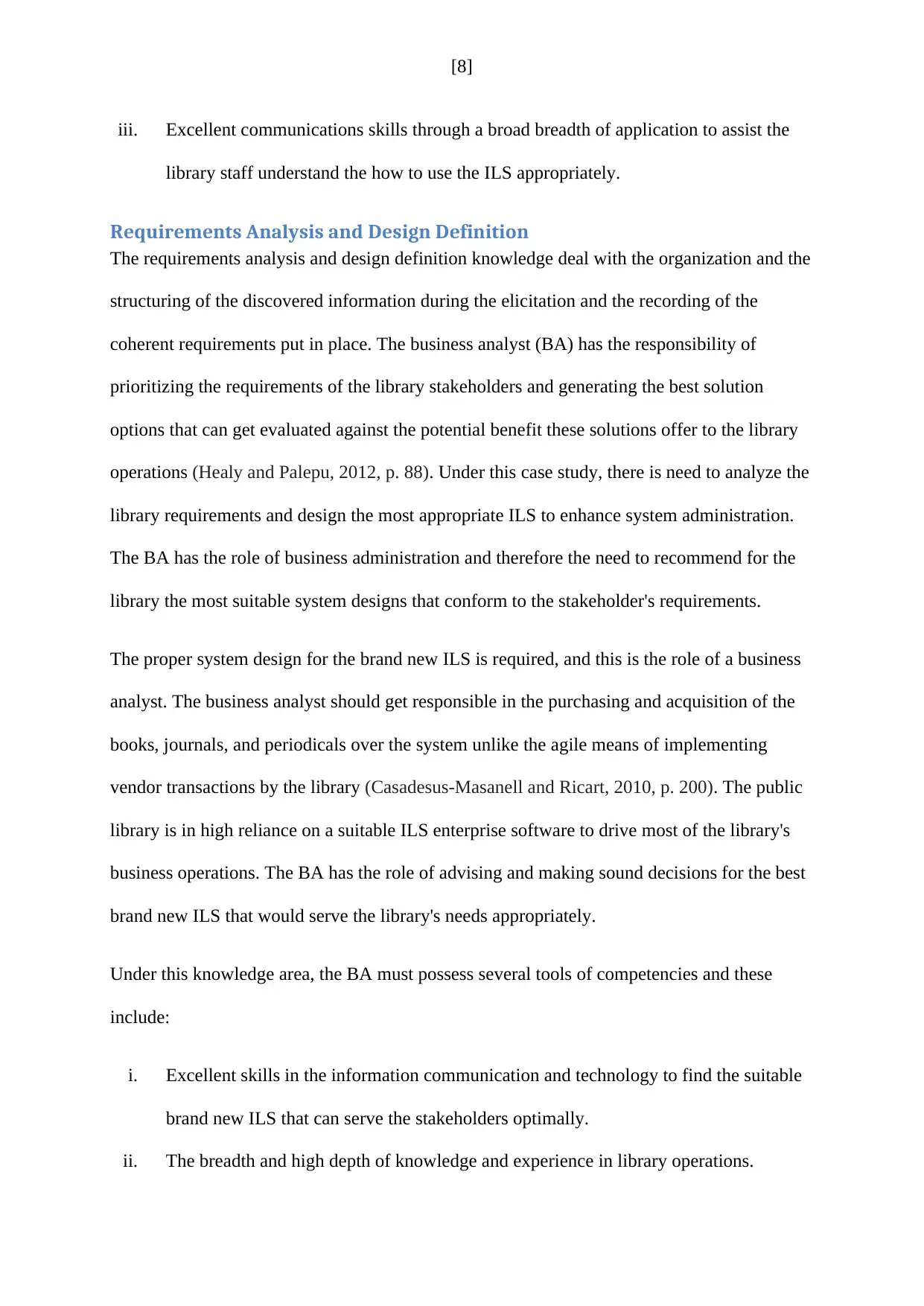
[8]
iii. Excellent communications skills through a broad breadth of application to assist the
library staff understand the how to use the ILS appropriately.
Requirements Analysis and Design Definition
The requirements analysis and design definition knowledge deal with the organization and the
structuring of the discovered information during the elicitation and the recording of the
coherent requirements put in place. The business analyst (BA) has the responsibility of
prioritizing the requirements of the library stakeholders and generating the best solution
options that can get evaluated against the potential benefit these solutions offer to the library
operations (Healy and Palepu, 2012, p. 88). Under this case study, there is need to analyze the
library requirements and design the most appropriate ILS to enhance system administration.
The BA has the role of business administration and therefore the need to recommend for the
library the most suitable system designs that conform to the stakeholder's requirements.
The proper system design for the brand new ILS is required, and this is the role of a business
analyst. The business analyst should get responsible in the purchasing and acquisition of the
books, journals, and periodicals over the system unlike the agile means of implementing
vendor transactions by the library (Casadesus-Masanell and Ricart, 2010, p. 200). The public
library is in high reliance on a suitable ILS enterprise software to drive most of the library's
business operations. The BA has the role of advising and making sound decisions for the best
brand new ILS that would serve the library's needs appropriately.
Under this knowledge area, the BA must possess several tools of competencies and these
include:
i. Excellent skills in the information communication and technology to find the suitable
brand new ILS that can serve the stakeholders optimally.
ii. The breadth and high depth of knowledge and experience in library operations.
iii. Excellent communications skills through a broad breadth of application to assist the
library staff understand the how to use the ILS appropriately.
Requirements Analysis and Design Definition
The requirements analysis and design definition knowledge deal with the organization and the
structuring of the discovered information during the elicitation and the recording of the
coherent requirements put in place. The business analyst (BA) has the responsibility of
prioritizing the requirements of the library stakeholders and generating the best solution
options that can get evaluated against the potential benefit these solutions offer to the library
operations (Healy and Palepu, 2012, p. 88). Under this case study, there is need to analyze the
library requirements and design the most appropriate ILS to enhance system administration.
The BA has the role of business administration and therefore the need to recommend for the
library the most suitable system designs that conform to the stakeholder's requirements.
The proper system design for the brand new ILS is required, and this is the role of a business
analyst. The business analyst should get responsible in the purchasing and acquisition of the
books, journals, and periodicals over the system unlike the agile means of implementing
vendor transactions by the library (Casadesus-Masanell and Ricart, 2010, p. 200). The public
library is in high reliance on a suitable ILS enterprise software to drive most of the library's
business operations. The BA has the role of advising and making sound decisions for the best
brand new ILS that would serve the library's needs appropriately.
Under this knowledge area, the BA must possess several tools of competencies and these
include:
i. Excellent skills in the information communication and technology to find the suitable
brand new ILS that can serve the stakeholders optimally.
ii. The breadth and high depth of knowledge and experience in library operations.
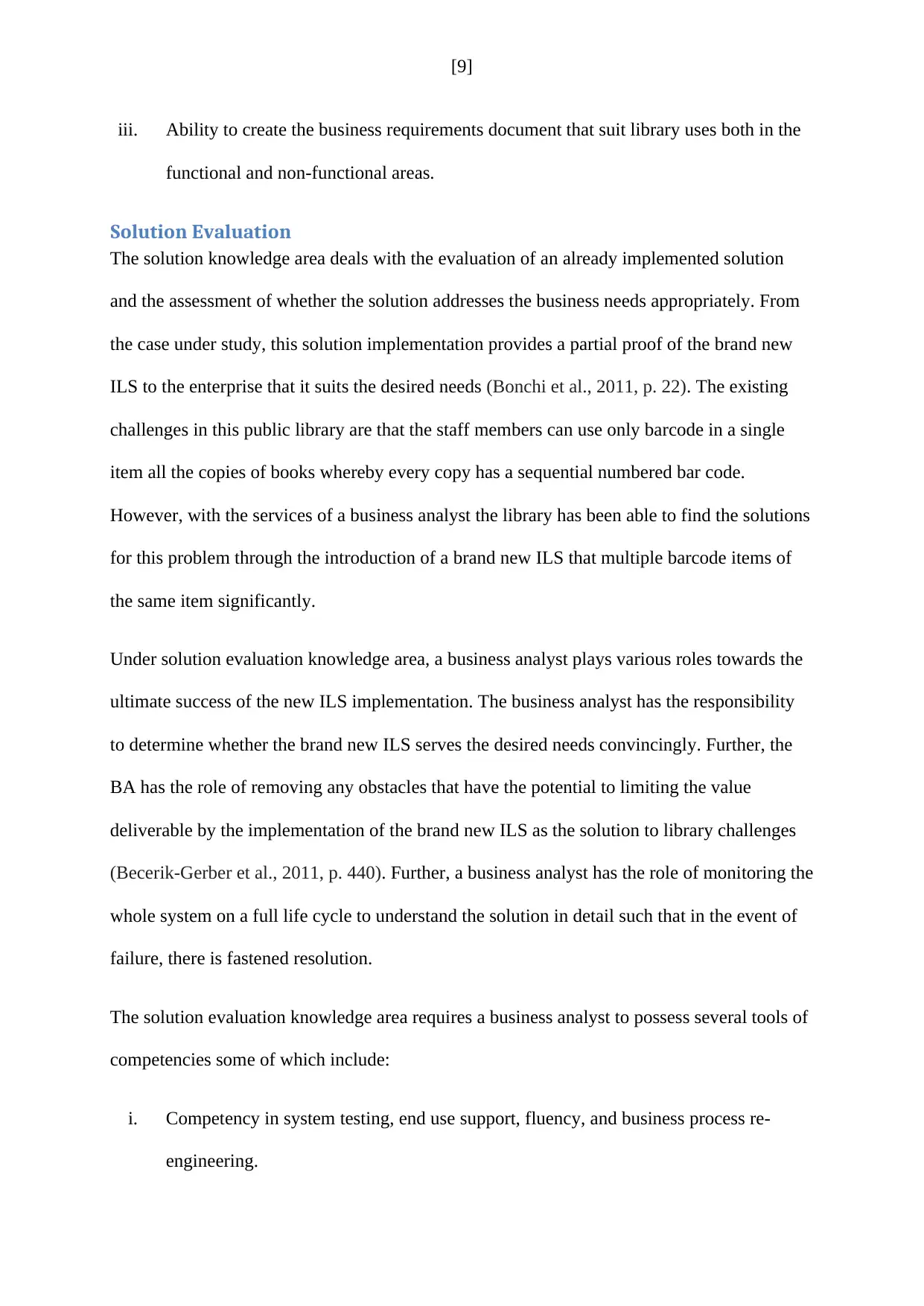
[9]
iii. Ability to create the business requirements document that suit library uses both in the
functional and non-functional areas.
Solution Evaluation
The solution knowledge area deals with the evaluation of an already implemented solution
and the assessment of whether the solution addresses the business needs appropriately. From
the case under study, this solution implementation provides a partial proof of the brand new
ILS to the enterprise that it suits the desired needs (Bonchi et al., 2011, p. 22). The existing
challenges in this public library are that the staff members can use only barcode in a single
item all the copies of books whereby every copy has a sequential numbered bar code.
However, with the services of a business analyst the library has been able to find the solutions
for this problem through the introduction of a brand new ILS that multiple barcode items of
the same item significantly.
Under solution evaluation knowledge area, a business analyst plays various roles towards the
ultimate success of the new ILS implementation. The business analyst has the responsibility
to determine whether the brand new ILS serves the desired needs convincingly. Further, the
BA has the role of removing any obstacles that have the potential to limiting the value
deliverable by the implementation of the brand new ILS as the solution to library challenges
(Becerik-Gerber et al., 2011, p. 440). Further, a business analyst has the role of monitoring the
whole system on a full life cycle to understand the solution in detail such that in the event of
failure, there is fastened resolution.
The solution evaluation knowledge area requires a business analyst to possess several tools of
competencies some of which include:
i. Competency in system testing, end use support, fluency, and business process re-
engineering.
iii. Ability to create the business requirements document that suit library uses both in the
functional and non-functional areas.
Solution Evaluation
The solution knowledge area deals with the evaluation of an already implemented solution
and the assessment of whether the solution addresses the business needs appropriately. From
the case under study, this solution implementation provides a partial proof of the brand new
ILS to the enterprise that it suits the desired needs (Bonchi et al., 2011, p. 22). The existing
challenges in this public library are that the staff members can use only barcode in a single
item all the copies of books whereby every copy has a sequential numbered bar code.
However, with the services of a business analyst the library has been able to find the solutions
for this problem through the introduction of a brand new ILS that multiple barcode items of
the same item significantly.
Under solution evaluation knowledge area, a business analyst plays various roles towards the
ultimate success of the new ILS implementation. The business analyst has the responsibility
to determine whether the brand new ILS serves the desired needs convincingly. Further, the
BA has the role of removing any obstacles that have the potential to limiting the value
deliverable by the implementation of the brand new ILS as the solution to library challenges
(Becerik-Gerber et al., 2011, p. 440). Further, a business analyst has the role of monitoring the
whole system on a full life cycle to understand the solution in detail such that in the event of
failure, there is fastened resolution.
The solution evaluation knowledge area requires a business analyst to possess several tools of
competencies some of which include:
i. Competency in system testing, end use support, fluency, and business process re-
engineering.
⊘ This is a preview!⊘
Do you want full access?
Subscribe today to unlock all pages.

Trusted by 1+ million students worldwide
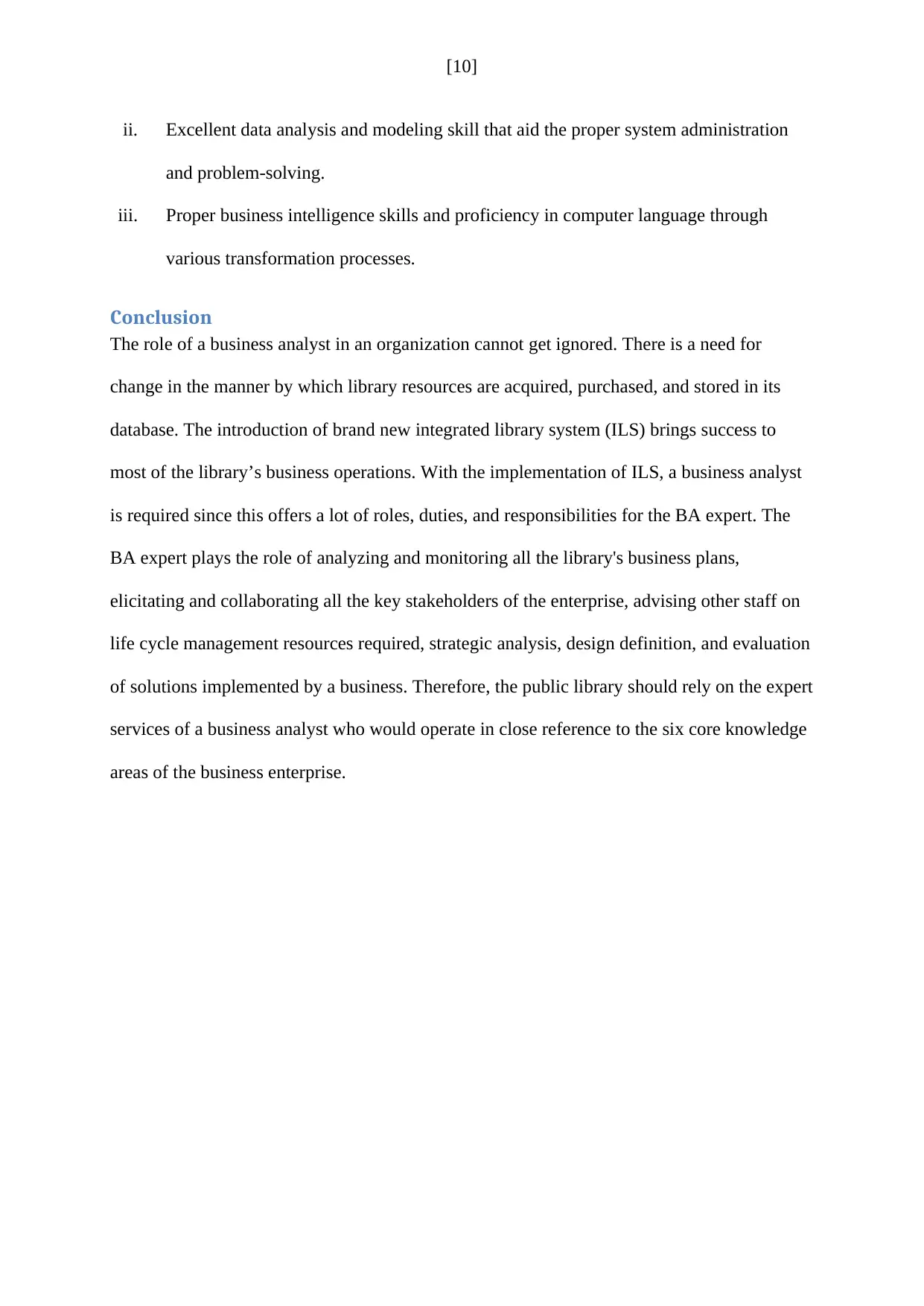
[10]
ii. Excellent data analysis and modeling skill that aid the proper system administration
and problem-solving.
iii. Proper business intelligence skills and proficiency in computer language through
various transformation processes.
Conclusion
The role of a business analyst in an organization cannot get ignored. There is a need for
change in the manner by which library resources are acquired, purchased, and stored in its
database. The introduction of brand new integrated library system (ILS) brings success to
most of the library’s business operations. With the implementation of ILS, a business analyst
is required since this offers a lot of roles, duties, and responsibilities for the BA expert. The
BA expert plays the role of analyzing and monitoring all the library's business plans,
elicitating and collaborating all the key stakeholders of the enterprise, advising other staff on
life cycle management resources required, strategic analysis, design definition, and evaluation
of solutions implemented by a business. Therefore, the public library should rely on the expert
services of a business analyst who would operate in close reference to the six core knowledge
areas of the business enterprise.
ii. Excellent data analysis and modeling skill that aid the proper system administration
and problem-solving.
iii. Proper business intelligence skills and proficiency in computer language through
various transformation processes.
Conclusion
The role of a business analyst in an organization cannot get ignored. There is a need for
change in the manner by which library resources are acquired, purchased, and stored in its
database. The introduction of brand new integrated library system (ILS) brings success to
most of the library’s business operations. With the implementation of ILS, a business analyst
is required since this offers a lot of roles, duties, and responsibilities for the BA expert. The
BA expert plays the role of analyzing and monitoring all the library's business plans,
elicitating and collaborating all the key stakeholders of the enterprise, advising other staff on
life cycle management resources required, strategic analysis, design definition, and evaluation
of solutions implemented by a business. Therefore, the public library should rely on the expert
services of a business analyst who would operate in close reference to the six core knowledge
areas of the business enterprise.
Paraphrase This Document
Need a fresh take? Get an instant paraphrase of this document with our AI Paraphraser

[11]
List of References
Becerik-Gerber, B., Jazizadeh, F., Li, N. and Calis, G., 2011. Application areas and data
requirements for BIM-enabled facilities management. Journal of construction engineering
and management, 138(3), pp.431-442.
Bonchi, F., Castillo, C., Gionis, A. and Jaimes, A., 2011. Social network analysis and mining
for business applications. ACM Transactions on Intelligent Systems and Technology
(TIST), 2(3), p.22.
Bushee, B.J., Core, J.E., Guay, W. and Hamm, S.J., 2010. The role of the business press as an
information intermediary. Journal of Accounting Research, 48(1), pp.1-19.
Casadesus-Masanell, R. and Ricart, J.E., 2010. From strategy to business models and onto
tactics. Long range planning, 43(2), pp.195-215.
Clarke, R., and Eck, J.E., 2014. Become a problem-solving crime analyst. Routledge.
Fleisher, C.S. and Bensoussan, B.E., 2015. Business and competitive analysis: effective
application of new and classic methods. FT Press.
Galliers, R.D., and Leidner, D.E. eds., 2014. Strategic information management: challenges
and strategies in managing information systems. Routledge.
Healy, P.M. and Palepu, K.G., 2012. Business analysis valuation: Using financial statements.
Cengage Learning.
Hwang, B.G. and Ng, W.J., 2013. Project management knowledge and skills for green
construction: Overcoming challenges. International Journal of Project Management, 31(2),
pp.272-284.
Kendall, K.E., and Kendall, J.E., 2010. Systems analysis and design. Prentice Hall Press.
List of References
Becerik-Gerber, B., Jazizadeh, F., Li, N. and Calis, G., 2011. Application areas and data
requirements for BIM-enabled facilities management. Journal of construction engineering
and management, 138(3), pp.431-442.
Bonchi, F., Castillo, C., Gionis, A. and Jaimes, A., 2011. Social network analysis and mining
for business applications. ACM Transactions on Intelligent Systems and Technology
(TIST), 2(3), p.22.
Bushee, B.J., Core, J.E., Guay, W. and Hamm, S.J., 2010. The role of the business press as an
information intermediary. Journal of Accounting Research, 48(1), pp.1-19.
Casadesus-Masanell, R. and Ricart, J.E., 2010. From strategy to business models and onto
tactics. Long range planning, 43(2), pp.195-215.
Clarke, R., and Eck, J.E., 2014. Become a problem-solving crime analyst. Routledge.
Fleisher, C.S. and Bensoussan, B.E., 2015. Business and competitive analysis: effective
application of new and classic methods. FT Press.
Galliers, R.D., and Leidner, D.E. eds., 2014. Strategic information management: challenges
and strategies in managing information systems. Routledge.
Healy, P.M. and Palepu, K.G., 2012. Business analysis valuation: Using financial statements.
Cengage Learning.
Hwang, B.G. and Ng, W.J., 2013. Project management knowledge and skills for green
construction: Overcoming challenges. International Journal of Project Management, 31(2),
pp.272-284.
Kendall, K.E., and Kendall, J.E., 2010. Systems analysis and design. Prentice Hall Press.
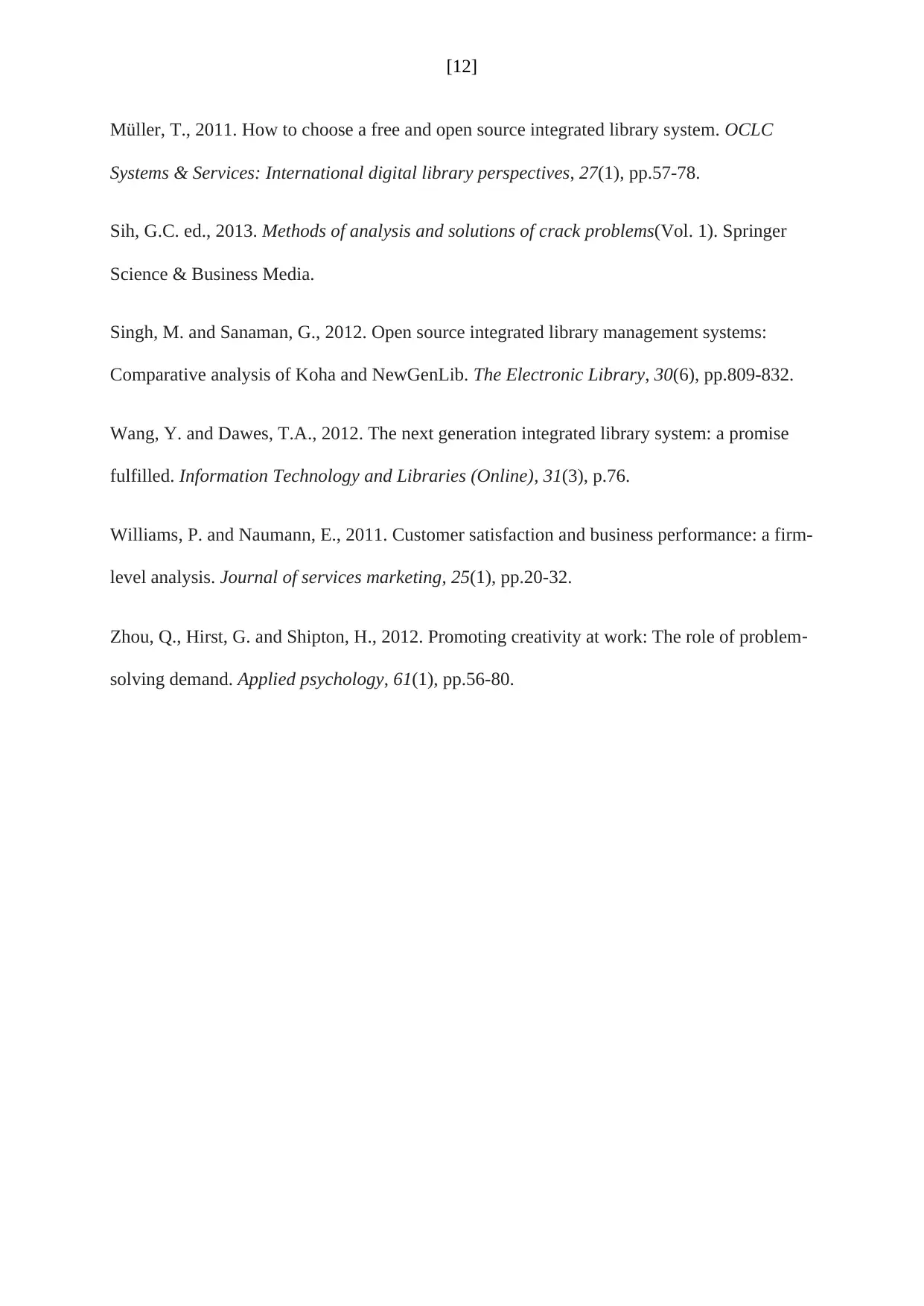
[12]
Müller, T., 2011. How to choose a free and open source integrated library system. OCLC
Systems & Services: International digital library perspectives, 27(1), pp.57-78.
Sih, G.C. ed., 2013. Methods of analysis and solutions of crack problems(Vol. 1). Springer
Science & Business Media.
Singh, M. and Sanaman, G., 2012. Open source integrated library management systems:
Comparative analysis of Koha and NewGenLib. The Electronic Library, 30(6), pp.809-832.
Wang, Y. and Dawes, T.A., 2012. The next generation integrated library system: a promise
fulfilled. Information Technology and Libraries (Online), 31(3), p.76.
Williams, P. and Naumann, E., 2011. Customer satisfaction and business performance: a firm-
level analysis. Journal of services marketing, 25(1), pp.20-32.
Zhou, Q., Hirst, G. and Shipton, H., 2012. Promoting creativity at work: The role of problem‐
solving demand. Applied psychology, 61(1), pp.56-80.
Müller, T., 2011. How to choose a free and open source integrated library system. OCLC
Systems & Services: International digital library perspectives, 27(1), pp.57-78.
Sih, G.C. ed., 2013. Methods of analysis and solutions of crack problems(Vol. 1). Springer
Science & Business Media.
Singh, M. and Sanaman, G., 2012. Open source integrated library management systems:
Comparative analysis of Koha and NewGenLib. The Electronic Library, 30(6), pp.809-832.
Wang, Y. and Dawes, T.A., 2012. The next generation integrated library system: a promise
fulfilled. Information Technology and Libraries (Online), 31(3), p.76.
Williams, P. and Naumann, E., 2011. Customer satisfaction and business performance: a firm-
level analysis. Journal of services marketing, 25(1), pp.20-32.
Zhou, Q., Hirst, G. and Shipton, H., 2012. Promoting creativity at work: The role of problem‐
solving demand. Applied psychology, 61(1), pp.56-80.
⊘ This is a preview!⊘
Do you want full access?
Subscribe today to unlock all pages.

Trusted by 1+ million students worldwide
1 out of 12
Related Documents
Your All-in-One AI-Powered Toolkit for Academic Success.
+13062052269
info@desklib.com
Available 24*7 on WhatsApp / Email
![[object Object]](/_next/static/media/star-bottom.7253800d.svg)
Unlock your academic potential
Copyright © 2020–2026 A2Z Services. All Rights Reserved. Developed and managed by ZUCOL.





